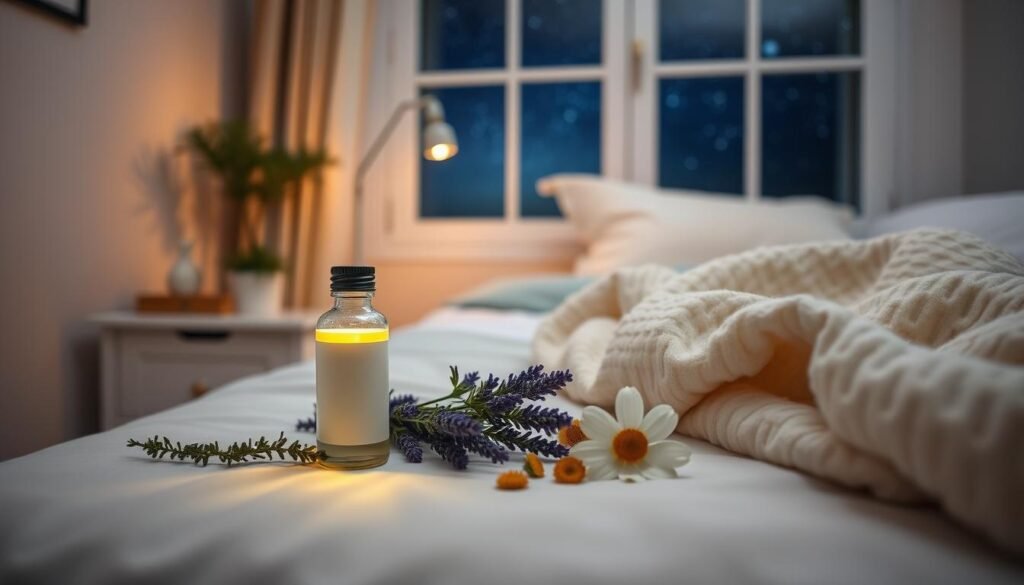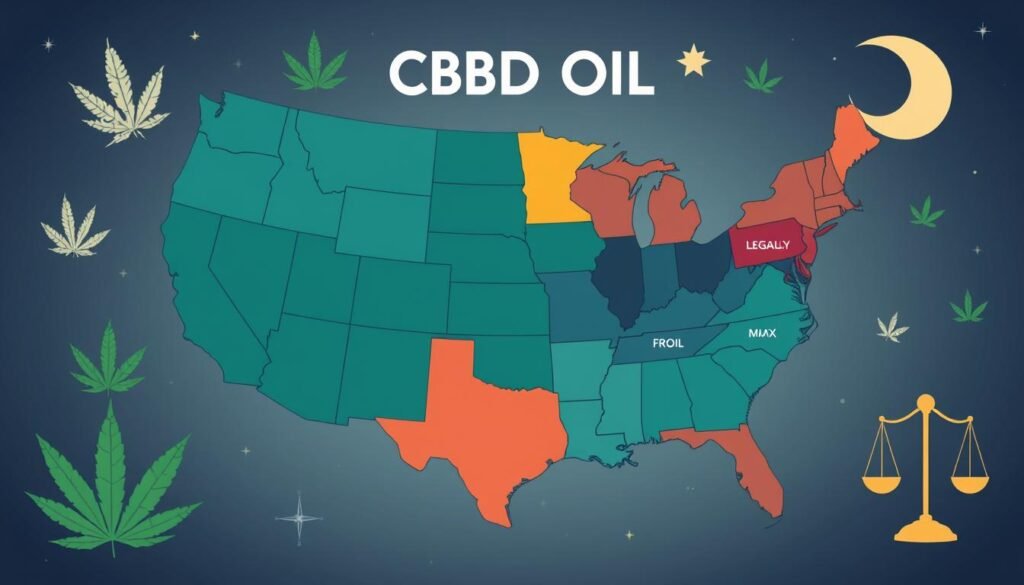About 30% of people find it hard to fall or stay asleep. They are now looking at CBD oil as a safe way to get better sleep. It’s showing promise as a natural alternative to usual sleep drugs. This is because it helps improve sleep without making you rely on medicine.
Studies highlight its benefits, like one showing 60% of users no longer had insomnia after taking CBD. The use of CBD oil for a good night’s sleep is becoming well-known in the U.S. To learn more about how CBD helps with sleep, read this article.
Key Takeaways
- Insomnia affects up to 30% of the population, prompting searches for effective treatments.
- CBD oil shows promise as a non-habit forming alternative for sleep improvement.
- Studies reveal significant sleep quality enhancements with cannabis oil use.
- Natural sleep aids like CBD can provide relief without traditional medication risks.
- Proper dosage and timing are essential for maximizing the effectiveness of CBD products.
Understanding Insomnia and Its Causes
Insomnia affects many adults at least once. It makes falling or staying asleep hard. This leads to a lot of sleep deprivation. Knowing the symptoms and causes is key to finding insomnia relief.
Common Symptoms of Insomnia
Insomnia can cause several symptoms, such as:
- Fatigue
- Irritability
- Difficulties concentrating
- Unrefreshing sleep
- Daytime sleepiness
These issues can mess with your day and health.
Factors Contributing to Sleep Deprivation
Many things can cause sleep deprivation. Key factors include:
- Stress and Anxiety: They can make it hard to sleep well.
- Chronic Pain: Pain makes sleeping difficult.
- Caffeine Intake: Too much caffeine affects your sleep.
- Environmental Influences: Loud noise or bad mattresses can keep you awake.
What is CBD and How Does It Work?
Cannabidiol, or CBD, is a compound from the cannabis plant that doesn’t get you high. It’s been getting a lot of attention for helping with sleep. It does this by working with the body’s endocannabinoid system (ECS). The ECS helps keep the body balanced and in a good state.
Unlike THC, CBD won’t make you feel “high.” That’s why people looking for health benefits without the high choose CBD.
Overview of Cannabidiol (CBD)
Recently, more people have turned to hemp-based products. About 64% of U.S. adults have tried using CBD. Many of them even talk to healthcare providers before trying it. The CBD market was worth $18 billion in 2022. It’s expected to get even bigger in the coming years.
CBD is looked to for help with health issues like anxiety and chronic pain. These problems can make getting good sleep hard.
The Endocannabinoid System and Sleep
The endocannabinoid system is key to how CBD helps with sleep. Research shows that CBD might make sleep better in a few ways. For example, 85% of epilepsy patients sleeping better with CBD treatment after three months.
A report from the World Health Organization in 2018 said CBD is safe and not addictive. This makes it a good natural option for sleep problems.
CBD Oil Insomnia: Can it Really Help?
CBD oil is gaining popularity as an insomnia remedy. Studies show it may improve sleep by reducing anxiety and pain. A 2022 review supports CBD’s effectiveness in lessening insomnia symptoms, especially when used with THC. This has sparked further interest in how best to use CBD safely.
Research Insights on CBD and Sleep Disorders
Researchers are keen on CBD as a natural sleep aid. A study in 2019 found that CBD helped with sleep and anxiety within a month. Clinical trials have explored doses from 25 mg to 1,500 mg daily. Starting low and slowly increasing the dose seems to help with sleep.
How CBD Affects Sleep Quality
CBD’s impact on sleep goes beyond just making you sleepy. It can reduce anxiety and pain, leading to better sleep. However, choosing quality CBD products is vital since the FDA doesn’t oversee their safety. Always talk to a healthcare provider before trying CBD for sleep.
| Study Year | Findings | Dosage Range (mg) | Duration of Use |
|---|---|---|---|
| 2022 | CBD helps relieve insomnia symptoms, especially with THC | N/A | N/A |
| 2019 | Users reported improved anxiety and sleep after one month | 25 – 1,500 | 1 month |
| Various Studies | CBD may alleviate pain and anxiety, leading to better sleep | N/A | N/A |
Research continues to delve into CBD’s role in combating insomnia. For deeper insights, check out detailed studies on this natural sleep solution and its safety.
The Benefits of Using CBD Oil for Sleep
For many people, CBD oil is a natural solution for insomnia. It’s becoming popular as a way to improve sleep without strong drugs. People using CBD oil report less anxiety, which helps them fall asleep easier. This calming effect makes CBD oil a top choice for those with sleep troubles.
Natural Sleep Aid for Insomniacs
CBD oil is praised in the wellness world as a top natural sleep aid. It helps users fall asleep and stay asleep more easily. A survey in 2022 showed that 64% of U.S. adults have tried a CBD product, often on a doctor’s advice. With more research showing its benefits for sleep, CBD oil is a promising option for those with sleep issues.
Non-Habit Forming Solutions Compared to Traditional Medications
CBD oil stands out because it doesn’t lead to addiction like some medicines do. Many prescription sleep aids can cause dependencies, which are tough to break. But CBD oil doesn’t have the same risk of addiction. Even with higher doses, it’s considered low-risk. People moving from usual sleep meds to CBD often find the switch smoother.

Forms of CBD for Insomnia Relief
Different CBD forms help those looking for insomnia relief find what works for them. Each method has its own advantages. This means people can pick the best way to find restful sleep with hemp products.
Oils and Tinctures
CBD oils and tinctures are favorites for helping with sleep. They absorb into the body quickly. People can also easily adjust how much they take, finding the right amount for calmness. These options act swiftly to improve sleep when used before going to bed.
Edibles and Gummies
CBD edibles like gummies are tasty and easy to take. They are made with natural ingredients, helping to ease you into relaxation. The effect starts later, which is good for those who need support all night.
Vaping and Topicals
Vaping gets CBD into your system fast, but there are concerns about its effect on lungs. CBD creams can soothe pain in specific areas, leading to better sleep. This method might enhance overall sleep quality by tackling pain directly.
How to Use CBD Oil for Better Sleep
Getting to know how to use cbd oil for sleep can really help. It’s all about finding the right dose and when to take it. Since everyone reacts to CBD differently, it’s crucial to start slowly and pay attention.
Recommended Dosage and Timing
Typically, starting doses for CBD oil range from 25 mg to 1500 mg. These are based on what each person needs and how their body reacts. It’s advised to start with a small amount. Then, you can gradually increase it to discover the best dose for better sleep. It’s best to take cbd oil about 30 to 60 minutes before you go to bed. This timing helps your body take in the CBD well.
Research shows that lots of people see better sleep from using CBD regularly. Specifically, about 66.7% of users found improved sleep quality in the first month of use.
Best Practices for Consumption
For the best results with cbd oil for insomnia, try these tips:
- Maintain a consistent schedule for taking CBD oil.
- Keep a sleep diary to track the effects and adjust dosages as needed.
- Consult a healthcare professional before starting any CBD regimen, especially for those with pre-existing health conditions or on prescribed medications.
- Monitor for any side effects, including but not limited to fatigue or gastrointestinal discomfort.
Following these guidelines can help you better improve your sleep with CBD oil. The increasing research on CBD’s effects points out how key personalized plans and educated choices are for restful sleep. For a deeper dive into using CBD oil for better sleep, take a look at this resource.

Evaluating the Effectiveness of CBD Products
Understanding CBD product labels for insomnia relief is key. It was found that 26% of CBD products online had less CBD than shown on the label. Meanwhile, nearly 43% contained more. This mismatch can cause unpredictable outcomes. It’s important for buyers to learn industry jargon and check third-party lab tests.
Understanding Product Labels and Potency
Product labels are supposed to tell you how much CBD is in a product. But they can be confusing. Looking at independent lab results helps check if products are as effective as they claim. Brands often share their testing methods. This makes it easier to know if you’re getting the right amount of CBD for sleep issues. Learning about terms like “full-spectrum,” “broad-spectrum,” and “isolate” also helps you choose wisely.
Factors Influencing Results
Your body weight, metabolism, and why you can’t sleep influence how CBD works for you. Studies show 80% of people using CBD for anxiety felt less anxious in a month, improving sleep. Dosages used in studies vary, with some up to 200 mg or more based on individual needs. Since everyone reacts differently, finding what works best for you is important.
Potential Side Effects and Risks of CBD
Exploring CBD for insomnia means knowing about side effects and risks. It’s usually safe, but some might feel mild side effects. Knowing them helps you decide if CBD is right for you.
Common Mild Side Effects
Some people face mild side effects from CBD. These can include:
- Dry mouth
- Drowsiness
- Fatigue
- Changes in appetite
- Diarrhea
These issues are mostly mild but can affect your day, especially if you’re new to CBD. Watching how you react helps decide if you should keep using it.
Interactions with Other Medications
CBD could interact with some medicines, mainly those processed by the liver. Those using medications like blood thinners need to be careful. It’s best to talk to a doctor first to avoid bad reactions, especially if you have health issues or take various medicines.
Choosing Quality CBD Products
Selecting the right CBD products is key for those looking to tackle insomnia with hemp. It’s critical to pick products that are safe and work well. The journey begins with grasping the value of third-party tests.
Importance of Third-Party Testing
Third-party testing is crucial for checking CBD products. It verifies their strength and ensures they’re free from bad stuff. Many trusted brands share their test outcomes. These show the exact cannabinoid levels.
Checking these results against the product label helps ensure quality. If there’s no third-party testing, it could mean the company isn’t open or focused on quality.
Identifying Reputable Brands
Choosing reliable brands is essential when looking for CBD solutions. There are ways to spot the good brands:
- Research customer reviews and testimonials to gauge user experiences.
- Evaluate the company’s history and their transparency regarding sourcing and production.
- Look for brands that make third-party testing results easily accessible.
- Consider products that are well-reviewed for specific issues like anxiety, chronic pain, and sleep quality.
Brands like CBDistillery and Lazarus Naturals are known for their quality and openness. Products like CBDistillery’s Sleep Synergy CBN + CBD 1:3 Tincture show what to seek in CBD options. Prioritizing safety and efficacy helps consumers feel sure about their choices.
| Brand | Product Type | Best For | Price Range |
|---|---|---|---|
| CBDistillery | Sleep Synergy CBN + CBD Tincture | Best Overall | Varies |
| Lazarus Naturals | Full-Spectrum, High Potency Tincture | Best Budget | $20 – $40 |
| CBDfx | CBD Oil Sleep Tincture | Best THC-Free | Varies |
| Medterra | CBD & Melatonin Sleep Tight Gummies | Best Gummies | $30 – $40 |
By focusing on safety, openness, and trusted brands, buyers can more easily find the right CBD products. This helps them discover solutions that meet their specific needs.
Legal Status of CBD in the United States
The legal status of CBD in the United States is complex. It mostly depends on where the CBD comes from. There’s a key difference between hemp-derived and marijuana-derived CBD. Knowing this can help buyers make better choices when getting hemp-based products.
Hemp-Derived vs. Marijuana-Derived CBD
Hemp-derived CBD is legal on a federal level. This is thanks to the 2018 Farm Bill. It says cannabis with less than 0.3 percent THC is okay. This law has helped hemp-derived remedies become more popular. On the other hand, marijuana-derived CBD is still illegal federally. It’s seen as a Schedule I drug. While some states allow it for either health or fun reasons, it’s not okay everywhere. This creates a mix of rules across the country.
State Laws and Regulations
State laws about CBD are all over the place. This means buyers need to be careful and know their local laws. For example, Colorado and Delaware are pretty open to CBD oil use. But, Idaho says no to any CBD with THC in it. Also, some states are strict about how hemp is used. Understanding state rules is key to not getting into trouble. For more info on rules, the FDA’s advice on cannabis products here is a good place to start.

The CBD market is expected to hit $80 billion by 2030. Yet, shoppers need to stay up-to-date with local laws. The way laws are changing shows why it’s crucial to keep learning for safe use.
Alternative Holistic Treatments for Insomnia
Looking for effective ways to fight insomnia often means trying different methods, not just CBD. Using natural sleep aids and changing your lifestyle can greatly improve sleep for those who struggle to find restful sleep.
Non-CBD Natural Sleep Aids
Many natural remedies are becoming popular for sleep. Here are a few that might help with insomnia:
- Melatonin supplements: They can make sleep better, especially for older people, by fixing the sleep-wake cycle. You might feel sleepy during the day or get headaches.
- Valerian root: Taken an hour before bed, this herb can help you sleep but might make you dizzy or upset your stomach.
- Chamomile: As an aromatherapy oil, it can lower anxiety and relax muscles, helping you unwind before sleep.
- Magnesium supplements: They help with sleep but taking a lot can cause stomach pain or nausea. Spinach and nuts have lots of this mineral.
- Passionflower: It can aid sleep but isn’t safe during pregnancy. It might make you feel confused or clumsy.
Incorporating Lifestyle Changes for Better Sleep
Using natural sleep aids and making positive lifestyle changes are key to better sleep. Here are some tips to try:
- Maintain a consistent sleep schedule: Sleeping and waking up at the same time helps your body’s clock.
- Practice relaxation techniques: Yoga, meditation, and deep-breathing can reduce stress for better sleep.
- Reduce screen time before bed: Avoiding screens helps prevent interference with sleep hormones.
- Create a comfortable sleep environment: A cool, dark, and quiet bedroom improves sleep quality.
- Engage in regular exercise: Exercise helps, but do it earlier in the day to boost sleep quality.
Adding these natural aids and making lifestyle changes can help tackle insomnia. It could lead to better sleep at night.
Conclusion
Exploring CBD oil for insomnia shows promise for those desiring peaceful sleep. Studies suggest it improves sleep quality. Because many in the U.S. seek CBD for sleep issues, it’s important to use it wisely. Knowing the right dosage and products is key to getting good results.
Using CBD for better sleep should go hand in hand with lifestyle changes. Adopting good sleep habits, managing stress, and eating well can make a big difference. Staying updated with research helps people make smart choices for better sleep with CBD.
More people are choosing CBD over traditional sleep aids, preferring a natural health approach. User experiences and research back up CBD’s benefit for deep sleep, especially with insomnia. This trend towards natural options shows a bright future for sleep health.